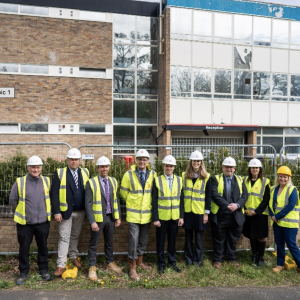Doncaster Race Day in Support of Children’s Charity
The Children’s Air Ambulance (TCAA) is hosting a fantastic Race Day in a bid to raise vital funds and awareness for the lifesaving charity.
A national service, TCAA is changing the face of paediatric and neonatal care through the high-speed transfer of critically ill babies and children – flying them from one hospital to another for specialist care. The clinically-designed helicopters essentially provide a flying intensive care unit.
Set to take place at Doncaster Racecourse on Saturday 16 July, the charity’s fabulous event packages on offer include free parking, admission badges and tickets, a drinks reception, a three-course dinner, live racing, and a live music concert by the legendary Nile Rodgers and Chic in the evening.
About this, TCAA Community Fundraising Executive, Sharon Evans, said: “Guests can relax at their private table for the evening and enjoy a sumptuous three-course meal that offers a bird’s eye view of the finishing post.
“It really is the perfect opportunity to enjoy an evening with colleagues, family, and friends whilst raising vital funds for a very worthy cause.”
With sponsorship packages also available to purchase, there’s an opportunity to become a race sponsor for the evening, which includes naming rights, accessing the exclusive parade ring, presenting the trophy to the winner, and many more benefits.
Amongst the guests in attendance will be Daniel Clegg – father of former TCAA patient Pippa Clegg-Rimmer – who will give a first-hand account of Pippa’s story and why the service is so vitally important.
Pippa – from Sheffield – has a very rare form of pulmonary hypertension, one of only four cases ever recorded, and she was the first person under the age of 14 in the UK to have surgery to remove blood clots from her heart and lungs.
Before the operation, her parents were told that there were no guarantees she would survive surgery but, as her condition was rapidly deteriorating and her life expectancy was less than a year, they felt they had no alternative but to give their consent for it to go ahead.
Miraculously, Pippa defied the odds, and four weeks after she underwent the ground-breaking surgery, she was flown on the Children’s Air Ambulance from London to Sheffield to be admitted to Sheffield Children’s Hospital.
Her dad Daniel accompanied her on the 70-minute transfer, a journey that would have otherwise taken over six hours due to distance and traffic hold-ups.
Reflecting on this, Daniel said: “My family is very grateful that the Children’s Air Ambulance was there when we needed it. The charity is funded solely by generous donations so I encourage people to support them by going to events like the Doncaster Race Day, and I hope that me sharing our story to those at the event will exemplify what a vital and worthy cause TCAA is to support,” says Daniel.
The charity has limited places available, so to purchase one of the packages or a table at the event please contact: sharon.evans@childrensairambulance.org.uk or call 07387 265 613.
MultiWeb Marketing trio to plunge 15,000ft for Bluebell Wood Children’s Hospice
A plucky trio from Doncaster-based MultiWeb Marketing are going the extra mile – or three – in a daredevil stunt for Bluebell Wood Children’s Hospice.
The community-spirited company’s senior leadership team will be plunging 15,000ft in a sponsored skydive to raise much-needed funds. That’s almost three hair-raising miles from stepping out of the plane door before they return to the safety of solid ground!
For Founder Paul Smith, Operations Manager Adrian Blatherwick and Commercial Director Lewis Smith, it’s all about the cause.
“We have a proud history of supporting charities and we’re always looking for ways we can give something back,” said Paul, who founded the award-winning company in 2013.
“I have three children of my own and it’s beyond comprehension what some of the children and families go though, so I couldn’t think of a more worthy cause.”
Commercial Director Lewis Smith echoes Paul’s motivations.
“We wanted to support Bluebell Wood because of the fantastic work it does – it’s a no-brainer really,” he said.
“I know the subject can be somewhat taboo, but the work that Bluebell Wood does in making children and families as comfortable as possible in such difficult circumstances is just remarkable.”
None of the trio are exactly thrilled at the prospect of hurling themselves from a plane, but they’re keen to push themselves to the limit.
“It seemed to us that we needed to do something a little bit out of the ordinary to raise as much as possible for such a fantastic cause,” said Paul.
“I’ve never done a skydive before, but I used to be something of an adrenaline junkie – although that was several decades ago now.
“I feel pretty gung-ho about it at the moment but it’s very easy to claim bravery! I’m sure that will wither away quite quickly when the doors open at 15,000 feet!”
Lewis is not letting his fear of heights put him off.
“It’s not everyone’s cup of tea and I must admit I’m not keen on heights at all,” he said.
“I would say that I’m quite nervous about it – but it’s something we’re all very much committed to and knowing we’re doing it for such an important cause is a great motivator.”
The colleagues are aiming to raise £1,200 with their sponsored skydive and are also planning another challenge at Lake Windermere in the summer. You can support their efforts here
Eleanor Hughes, Regional Fundraiser at Bluebell Wood, said: “We’d like to say a huge thank you to Paul, Adrian and Lewis for bravely taking on our skydive this year.
“As well as raising funds to help us make precious memories with local children and families, you’ll have a truly memorable day you’ll never forget.
“Best of luck on the day and we’ll look forward to hearing all about it.”
If you’d like to test your mettle and raise funds for a life-changing local charity, you can sign up to Bluebell Wood’s skydive here www.bluebellwood.org/skydive
SYMCA Chief Executive, Dr Dave Smith to stand down
Chief Executive of the South Yorkshire Mayoral Combined Authority, Dr Dave Smith, has announced he is standing down from the role.
Dr Smith has led the organisation since his arrival in 2016. He worked with the Mayor and Local Authority leaders to complete the region’s landmark devolution deal, acted as returning officer for the election of the South Yorkshire’s first and second Mayors, and led the integration of the MCA and South Yorkshire Passenger Transport Executive (PTE).
He will leave the post at the end of June 2022, supporting the transition to a new mayor following the election on Thursday 5 May.
Dr Dave Smith said:“I am proud to have been part of the MCA’s journey and to have supported the Mayor and LEP’s goals for South Yorkshire. It has been an immensely rewarding role to have and we have made great strides in challenging circumstances.
“After six years in the role I have decided the time is right for me to pursue other interests and opportunities. I would like to thank the Mayor, LEP and the MCA’s partners for their support during my time in post and our shared ambition to create a more prosperous South Yorkshire.”
Mayor of South Yorkshire, Dan Jarvis, said:“I want to thank Dave for his leadership and commitment during my time as Mayor, and the support he has provided local leaders and myself. We have faced many challenges together – getting devolution over the line Brexit transition, and a global pandemic – and we’re indebted to Dave for his expertise and endeavour during this time. I wish him all the very best for the future.”
Interim Chair of the South Yorkshire Local Enterprise Partnership (LEP) Lucy Nickson, said:
“I want to commend Dave for his service to the business community in South Yorkshire. During his tenure, Dave has supported our efforts to make our region an even better place to live, work and invest. He has put in place strong foundations for the Mayor and LEP to grow South Yorkshire’s economy at scale and pace in a way that benefits everyone.”
Arrangements for the appointment of a new Chief Executive will be confirmed after the election of South Yorkshire’s new mayor.
Connectus Business Solutions and KTSL merge to create the Connectus Group
Connectus Business Solutions and KTSL have merged to create the Connectus Group. The businesses and their 60 employees will continue to operate from its HQ in Donacaster, south Yorkshire, and five other UK and Ireland sites, and ambitious plans are in place to create further job opportunities across their commercial, delivery and support functions.
Roy Shelton will be CEO of the Connectus Group and the merger sets the Group on a path to becoming one of the leading IT Managed Service Providers (MSPs) in the UK. Their clients already include AIB, UCB, Unilever, the Peel Group, Sale Sharks and the National Police Air Service.
Commenting on the merger Roy Shelton, CEO of Connectus Group said: “Today is the start of an exciting new chapter for Connectus Business Solutions and KTSL and will present an opportunity for further growth and job creation.
“By bringing these two great organisations together and creating Connectus Group, we have significantly increased our technical capability, boosted our delivery resources and further deepened our pool of commercial experience. This is the third transaction in as many years for Connectus, having been forced to pause our ambitious merger and acquisition strategy due to the global pandemic.
“Although that period presented challenges, it has also thrown up exciting opportunities for forward-thinking businesses like ours that can adapt quickly to the changing needs of our clients.
“This merger allows both businesses to work together on a shared vision, which is to deliver efficient, collaborative and sustainable services for our customers and staff and to execute revenue growth via a planned and controlled expansion programme.
“It also brings a greater scale, allowing us to bid for larger opportunities, increase our recurring managed services revenue and will allow us to leverage our sixty-plus members of staff in a more collaborative manner.”
Aaron Perrott, the CTO of KTSL said: “This is an exciting merger that will allow us to increase value for clients no matter their size. The significant investment KTSL has made in our own market leading Intellectual Property over many years will provide clear differentiation for the Connectus Group.
“Hybrid working has opened up opportunities for clients to leverage our advanced Tech Bar and Portal capabilities; simplifying, integrating and consolidating complex tools and platforms for our clients.
“This merger will allow us to extend our range of service solutions built on more than 20 years as a global leader in the ITSM and Service Integration space. It will extend our portfolio to include cyber security and a secure hosting capability for our solutions. This will broaden our capability to offer highly relevant solutions to help our combined clients mitigate cost and risk, improving their underlying service and employee experience.
“With such a lot to offer, and our ability to unlock rapid returns and benefits, we are all looking forward to the next phase of our growth together.”
The merger comes following a due diligence and legal process which started last November. Connectus Group expects to deliver revenues of more than £10m in the current financial year ending March 2023 including significant and sustainable profits which will help pave the way for accelerated organic and inorganic growth.
Following the merger Rob Marks, the CEO of KTSL, will become the non-executive Chair of Connectus Group. The Connectus Group will be strengthened by the arrival of Keri Brocks, Company Secretary and Finance Manager; Paul Ruocco, Group CFO; Aaron Perrott, Group CTO; Tim McCue, Head of Professional Services; Mark Robinson Founding Director; Mark Wiseman, Group Commercial Officer and Andrew North, Group Sales Director.
The group’s HQ will remain in Doncaster and Connectus Group will continue to operate from their five offices in Salford, Corsham, Egham, Daresbury and Dublin.
For more than 20 years, Connectus Business Solutions has been a leading business connectivity and managed services partner, providing business critical infrastructure alongside fully managed solutions to help companies stay connected, protected and to collaborate effectively online as they scale and grow. With a two-decade legacy in telecommunications, Connectus helps clients to mitigate costs, complexity and risk and provides business critical infrastructure along with fully managed solutions. It has a dedicated, customer focused and technically capable team, who work with clients at their own pace and level of technical understanding to ensure great outcomes are achieved.
KTSL has excelled in the service management and integration space. They partner with BMC, 4ME, Jitterbit and Pagerduty to provide an extensive coverage of applications across the ITSM space. Their expertise spans a wide range of industries across public and private sectors with an 80-strong network of consultants based in the UK, Ireland, Czech Republic and India. It has successfully delivered over 1,000 projects for 180 customers, including AIB, UCB, Unilever and Balfour Beatty. KTSL has helped clients take full advantage of new technology to drive adoption of digital services, creating a digitally connected business combining people, data, processes and infrastructure.
Want to boost the performance of your business? Here are some ideas
If you’re a business owner and you’re seeking to boost its performance, then take a look at the following post. We’ll be providing some inspiration for how you can improve your business practices to help you reach your goals and targets. Read on to find out more.
Automation And Outsourcing
If you find that your business is receiving higher levels of customer demand, you may be wondering how best to cost-effectively increase workloads. Hiring more members of staff can be expensive and time-consuming, however, there are other options available. Automation and outsourcing services are two more economical options that can help you increase your business production, without the need for adding more team members to your payroll. Automation makes processes such as accounting, holiday entitlement, and customer service run in the background, so your staff can be working on other things whilst the automation software carries out set tasks. If the jobs you need to be carried out can’t be handled by automation software, you could also consider outsourcing. For example, outsourcing can be a great option for things such as recruitment, IT, and sales.
Understanding Business Sustainability
Having a clear and thorough understanding of business sustainability will help to make sure your business not only performs at its best now but into the future as well. Courses such as the sustainable finance course from the University of Cambridge can equip you with the knowledge you need to make more informed decisions for your business around finance, sustainability, and future practices. Understanding of topics such as these is also especially important for your management team and employees wishing to progress into management.
Conduct Performance Reviews For Employees
Performance reviews give an invaluable insight into the level at which your employees are operating and whether they require improvements in their performance. It gives you the opportunity to address any areas in which your employees require improvement, further training, or additional support. It also provides the chance for you to praise the targets and goals your employees are achieving and reward them for their hard work. Your business’s overall performance is made up of all the individuals working for you and their unique standards of performance. Therefore, it’s essential to regularly monitor this and form action plans if necessary.
Make Use Of Customer Feedback
Making use of customer feedback by using methods such as analysing reviews and conducting customer surveys is a great way to identify areas in which you could boost performance levels. There could be elements of the service or product you’re providing that could be improved. It could also be due to ineffective marketing methods or poor customer service.
Remote Vs Office-Based Working
The practice of remote working has recently become far more popular due to the need for businesses to work from home during the pandemic. However, many businesses actually found that their performance levels either stayed the same or increased while remote working. What’s more, many businesses also saved money by allowing workers to remain working from their own homes. Whether this is the right choice for you and your business will depend on your unique requirements, but it’s an option worth considering if you’re looking for ways to boost business performance, staff morale, and reduce costs.
South Yorkshire Chambers unite to call for Mayor-led transformation of region’s skills sector
Business leaders from across South Yorkshire will join forces today (29 April) to call for the region’s new Mayor to urgently tackle skills shortages that are holding the region back.
The three South Yorkshire Chambers (Sheffield, Barnsley & Rotherham and Doncaster) will make the call ahead of a Mayoral Hustings event taking place at Doncaster UTC.
A new Skills Manifesto has also been jointly produced by the Chambers which outlines the acute skills shortages facing the region’s businesses and the challenge of fragmented Government funding which has led to too many skills providers working at cross purposes.
The Manifesto includes 40 practical recommendations for a more agile and responsive skills system in South Yorkshire which drives opportunity, productivity, and wages. The Manifesto also calls on the county’s businesses to step up and get involved.
The new Mayor will be challenged to develop a new Skills Strategy for the region within 100 days of taking office and business leaders want the new Mayor to lobby Government for further devolution of powers and resources to impact skills policy.
The joint call comes after a hugely successful pilot over the past year. South Yorkshire was one of eight national trailblazers rolling out new Local Skills Improvement Plans (LSIP) on behalf of the Department for Education.
The Chambers consulted hundreds of businesses as part of the project and worked in tandem with other business organisations including the CBI, FSB, Manufacturing Forum, and Sheffield Digital. Strong partnerships were also forged with those in the broader skills community, including the public sector, colleges, Higher Education Institutions, and private providers.
Chief Executive of Doncaster Chamber Dan Fell said: “Workplace skills is the single biggest challenge facing South Yorkshire’s economy and residents.
“Skills drive productivity and wages and the average output of workers in South Yorkshire is around 20% lower than for the UK – a gap that hasn’t narrowed in nearly 20 years.
“Our region underperforms the UK on most indicators of employee skills, and this is borne out by the fact that South Yorkshire businesses are facing record skills shortages.
“If the output of South Yorkshire’s workers equalled England’s average, the region’s economy (GVA) would be £7.2bn bigger.
“We’ve learned a great deal during the pilot and have included our findings and recommendations in the Manifesto.
“A growing number of policy levers to affect the changes required are held by the Mayor. Some are at national level, but we have demonstrated during the pilot phase that when businesses, providers and industry bodies work collaboratively we can get to the heart of issues which are holding our region back from achieving its full potential.”
Andrew Denniff, Chief Executive of Barnsley & Rotherham Chamber, added: “Employers have told us they want to get involved in developing curriculums, programmes, and qualifications but there’s a gap in what they say and how involved they are. This needs to change. There needs to be a better and responsive digital platform connecting people, business needs, training, and opportunities.
“If the share of South Yorkshire’s population with higher-level qualifications matched England’s, an extra 49,000 people would be qualified to NVQ level 4 or above in our region.”
The Chambers are using the Manifesto launch to call on Government to pilot in South Yorkshire a new cash grant award scheme to incentivise employer engagement on skills with schools, colleges and universities.
“The region must put the business-facing engagement of skills and trade bodies piloted in the LSIP onto a permanent footing with an ongoing, funded programme of activity,” added Mr Denniff.
“We have got to fix our skills system and better connect employers and residents to training opportunities and that’s one of the reasons we’re also proposing an Apprenticeship Hub service which would link people and businesses to apprenticeship opportunities, share best practice and publicise successes.”
Karen Mosley, Chair of the Skills Accelerator Board and Sheffield Chamber President, said: “We must release the hidden workforce potential in our communities and that’s why we’re calling on whoever is elected as Mayor in early May to put the skills agenda front and centre.
“Throughout the LSIP pilot, all partners have demonstrated a strong will to work together to bring about change. With the right policies, resources, and political leadership we can address inequality and ensure South Yorkshire is known nationally as a region that ‘gets business’ and that is both enterprise and investment-ready.”
South Yorkshire Chambers of Commerce will publish their full manifesto and detailed recommendations in May.
Hull’s expertise goes to work on historic bridge in Scotland
Multi-disciplinary bridge works specialist Spencer Group from Hull is to design, build and maintain a temporary walkway for Grade II listed Connel Bridge, close to Oban in Scotland.
The walkway, which will be cantilevered off the east side of the bridge, will allow for pedestrian and cyclist access during a two-year project to replace the entire deck.
The walkway is expected to be completed in four months, with the possibility of retaining it depending on a feasibility study and full public consultation. The walkway construction has been programmed to cause minimal disruption to traffic and the local community.
The A828 Connel Bridge was the second largest cantilever bridge in Europe when it was built by Sir William Arrol in 1903. It links the villages of Connel and North Connel. Originally a railway bridge, it was used for both rail and road traffic from 1914, until the railway closed in 1966.
Spencer Group is carrying out the project for BEAR Scotland, a service provider in the Scottish roads maintenance sector, on behalf of the national transport agency for Scotland, Transport Scotland.
The temporary walkway is part of the critical enabling works ahead of the deck replacement scheme, and Spencer Group, which specialises in providing innovative solutions to complex engineering projects, is mitigating the impact the walkway works will have on traffic and the local community.
Luke Fisher, Sector Lead for Bridges and Structures at Spencer Group, said: “During the tender process we focused our proposals on a sympathetic walkway design and methodologies that reduced traffic management during the construction works.
“Our designers proposed a traditional steel walkway design that was in-keeping with the heritage of the bridge, clamping to the existing structure where possible, to minimise invasive construction works to the bridge interface points.
“A key element of the project is also to minimise the impact on local residents and traffic, both on Connel Bridge and on the A85 below. The original design intent was to install support brackets over the side of the masonry viaducts that would require rope access for installation, meaning traffic management would have needed to be in place on the A85.”
Eddie Ross, BEAR Scotland’s North West Representative, said: “We appreciate the historical importance of the A828 Connel Bridge and the vital transport link it provides to local communities.
“This project will allow teams to install a temporary footway on the east side of Connel Bridge, in advance of the deck replacement works which are scheduled to take place next year. The temporary walkway will maintain a route across the bridge whilst the bridge deck is replaced, as we will need to close the existing footpath and carriageway.”
Ethical hacking challenge platform secures government backing to prepare for launch into commercial market
A unique cyber security hacking and education platform – created by academics at Leeds Beckett University – has received government funding to help prepare it to launch into the commercial market.
Hacktivity Cyber Security Labs is a virtual lab environment – allowing computing students to remotely log into virtual machines (VMs) and receive randomly generated security or ethical hacking challenges, individualised to each user.
The platform features hands-on tasks, league tables, progress monitoring dashboards and instant feedback and challenges through a chatbot.
Dr Z. Cliffe Schreuders, Reader in Cyber Security and Director of the Cybercrime and Security Innovation Centre at Leeds Beckett, designed the Hacktivity platform. He explained: “Hacktivity is the product of nine years of academic research and development. Creating hacking challenges for our students helps them to put theory into practice. We want to make it fun and engaging to learn cyber security – so we have been developing a lot of our own software and techniques.”
The £32,000 funding boost was awarded as part of Innovate UK’s Cyber Academic Start-up Accelerator Programme (CyberASAP) – which aims to help universities to commercialise cyber security research.
During the first stage of the programme, the academic team will receive training to develop a value proposition, carry out market research, and investigate the pathways to commercialising the platform.
The team will then pitch for further stages of funding – to begin working with partner organisations and carry out further research and development.
Dr Schreuders said: “CyberASAP is a great opportunity to learn from experts how we can commercialise our state-of-the-art platform, grow its user-base outside of the university, and fund its continued growth – including further technical development and content creation.
“Hacktivity is a unique and useful resource and has had a great impact on our students. Our open source framework – SecGen – is already used by many internationally, and there is potential for so many more people to gain from what we have developed – from security professionals to other universities and employers.”
There are several unique features that Hacktivity provides in comparison to other existing platforms.
Paul Doney, Head of Subject for Computing at Leeds Beckett, explained: “Most hacking challenges involve manually setting up a challenge which you would use once – and each student would have the exact same challenge. Our software creates and automates that process and makes it interesting by randomising it – so that each student has a uniquely configured system and problem and a unique experience.
“We also have Hackerbot automated chatbots which present hacking and defensive challenges and carry out real attacks.”
Hacktivity has a large library of content. It has all been mapped to the Cyber Security Body of Knowledge (CyBOK) – the national Body of Knowledge informing and underpinning education and professional training for the cyber security sector. It challenges students’ skills on areas including systems security and defensive controls, web and network security, ethical hacking and penetration testing, malware analysis, software exploitation, and incident response and investigation.
One of the key elements of Hacktivity is its Capture the Flag games – and it has unique benefits for hosting events for this popular game across multiple universities or organisations. Capture the Flag competitions involve users working through security hacking and defensive challenges. Students are rewarded with ‘flags’ for completing tasks – a flag of text is revealed which the student can use to prove they have completed the challenge.
Dr Schreuders added: “We run regular Capture the Flag events on Hacktivity to give our students opportunities to engage, and explore security issues, beyond their course work.”
Growing number of businesses at risk of collapse, as costs spiral and Covid loan repayments come due, says new report
The latest Begbies Traynor “Red Flag Alert” research, which has examined the financial health of British companies for the past 15 years, highlights the strain two years of extraordinary financial pressures have had on thousands of UK companies.
Helped through the pandemic and its aftershocks by state support, the report now reveals a 19% jump in the number of companies in critical financial distress with these measures cut off and costs spiralling.
The most recent County Court Judgements (CCJs) data revealed 11,673 rulings in March – up 179% on the monthly average for the previous two years – and the highest level in a single month for five years.
With companies struggling with rising inflation, coupled with the demands of repaying Government Covid support loans, there is now a growing risk of a wave of insolvencies affecting vulnerable British businesses.
Julie Palmer, partner at Begbies Traynor, warned that unless there is action to allow struggling businesses to mitigate the impact of these pressures, they risk being unable to continue to operate.
“The critical distress and CCJ data are likely predictors of a wave of insolvencies coming – it’s just a case of when the dam holding it back finally bursts.
The latest Government insolvency figures for March reinforce this worrying trend with creditors voluntary liquidations – the most common type of corporate insolvency – more than doubling compared to March 2021 and up 62% compared to March 2019
“The Government’s finances are themselves taking a hit from the increasing interest environment; they are simply not able to introduce further significant funding into the system, and they now have a choice to make. Do they rush to recover funds handed out during the pandemic to ensure there was a functioning economy afterwards? Or look for ways to control the number of businesses that fail?
“Having put so much money into protecting businesses over the past two years, ministers won’t want to see it wasted as companies collapse, unable to repay their debts.”
Ms Palmer said one way the Government could ease the pressure on embattled businesses while not writing off debts racked up through measures such as the Coronavirus Business Interruption Loan Scheme (CBILS) would be taking a longer-term view.
She continued: “I’d expect low-cost forms of further support, probably through leniency in repaying pandemic funding.
“We could see an approach similar to war bonds, with terms being extended as ministers follow the adage that a rolling loan gathers no loss.
“Taking a hard line on repaying CBILS and other loans would likely drive businesses over the edge, risking the billions fed into the economy being wasted, and the legacy of this support probably explains the year-on-year fall in significant financial distress.”
Ric Traynor, executive chairman of Begbies Traynor, commented; “Inflation has become a global issue, not just a domestic problem. The effects of increasing costs are now starting to take their toll on businesses and consumers alike. For the first time in more than a decade, inflation is the prime concern for businesses.
“This could mean that companies which have just been surviving, being kept alive only by government support, finally succumb to the inevitable.
“Additionally, consumer demand is likely to slow markedly as cost pressures pile up ahead of the anticipated increase in energy costs in October, and families reduce their appetite for spending accordingly. If these pressures take their toll on both corporate and personal finances, it could be particularly difficult in the latter quarters of this year.”
Demolition of former Cummins factory in Lincolnshire paves the way for mixed-use area
A major milestone in the development of St Martin’s Park, Stamford, has been met as demolition and clearance of the former Cummins factory commences.
South Kesteven District Council and Burghley have appointed Contractor GF Tomlinson Group to undertake the work and they began site set up last week, with welfare units placed on site. Demolition works will begin shortly and will continue for the remainder of the year.
The 14.7-hectare St Martin’s Park will include a designated commercial area; mixed-use area; retirement village; range of residential properties, including affordable homes; and areas of green and open space.
Kelham Cooke, Leader of South Kesteven District Council, said: “This high-quality, well-designed and sustainable development will preserve and enhance the setting of this part of Stamford.
“The important mixed-use development will bring significant benefits to the town and wider area, providing new employment opportunities and homes for the town and district.
“We are really pleased to have reached the next phase of this collaboration which supports our vision for the area and are proud to be creating a legacy for future generations, while protecting our strong heritage.”
As joint landowners, both South Kesteven District Council and Burghley Estates are committed to long-term investment and growth in Stamford while creating a balanced community that meets local housing needs.
Miranda Rock, Burghley House Director, said: “We are delighted to be taking important steps towards creating a development which will bring huge benefits to Stamford and the wider economy.
“We will ensure the St Martin’s Park development delivers sensitive and sustainable mixed-use amenities that work for the whole community.”
Planning permission for the site was granted in October 2021 with the decision notice being issued last month.












